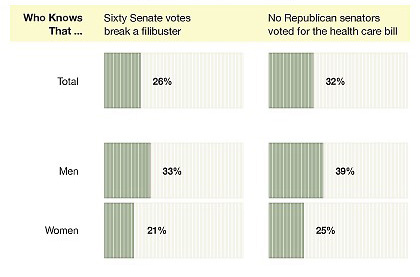Sandbox
Million, billion...whatever
Milo Schield sent the following article to the ASA Statistical Education group.
But who's counting?
Los Angeles Times, 31 January 2010
Doug Smith
This op/ed piece poses the following question: "The million-billion mistake is among the most common in journalism. But why?" Smith's research identified 23 instances of this mix-up in the Times over the last three years, most often in stories about money. For example, the paper reported that California spent $59.7 million on education in 2008-09, when the correct figure was $59.7 billion.
Lynn Arthur Steen of St. Olaf College is quoted as explaining
Generally people do not have sufficient experience with large numbers to have any intuitive sense of their size. They have no "anchor" to distinguish a million from a billion the way they might "feel" the difference between $10 and $10,000. So mistakes easily slip by unnoticed.
Milo is developing a course in quantitative journalism. The article quotes him as giving the following recommendation:
Newspapers should always break large numbers down into rates that make sense, he said. Rather than simply talking about California's $59-billion education budget, newspapers should break that out as $4,900 per household (ouch!), not the $4.90 it would be if the figure were in millions.
Submitted by Bill Peterson
Forsooth
"When the average age of the halftime act [at the Superbowl] is older than 47, the NFC team, the New Orleans Saints this year, has won nearly two-thirds of the time, and the games are about three times as likely to be blowouts."
Ben Austen, For Sunday's halftime show, bet the over, in the Wall Street Journal, 2 February 2010.
Submitted by Paul Alper
Lost in translation
New York Times, 29 January 2010
Charles M. Blow
Chance News often features examples of innumeracy or statistical illiteracy, but what about political illiteracy? Congress has spent a year debating health care reform, and the stalled legislation was widely discussed in coverage of President Obama's State of the Union address. Nevertheless, in above article we read that: "According to a survey released this week by the Pew Research Center for the People and the Press, only 1 person in 4 knew that 60 votes are needed in the Senate to break a filibuster and only 1 in 3 knew that no Senate Republicans voted for the health care bill."
The above reproduces a portion of an accompanying graphic entitled Widespread Political Illiteracy, which breaks out responses further based on age, education, political affiliation, etc. The results are not encouraging.
The article provides a link to an online quiz at the Pew Research Center website, where readers can test their own knowledge. Of the dozen questions there, the filibuster item had the worst score in the survey.
Blow suggests that a possible source of all the confusion may be people's choice of news outlets. He cites another recent poll which found that Fox News was the most trusted network news in the country, with 49% of respondents expressing trust. The ABC, NBC and CBS networks all got less than 40%. The full results from Public Policy Polling organization are available here. Political affiliation appeared to be a key factor. Fox was trusted by 74% of Republican respondents but only 30% of Democrats. By contrast, the other three networks were all trusted by a majority of Democrats but less than 20% of Republicans. According to Dean Debnan, President of Public Policy Polling,
A generation ago you would have expected Americans to place their trust in the most neutral and unbiased conveyors of news. But the media landscape has really changed and now they’re turning more toward the outlets that tell them what they want to hear.
Submitted by Paul Alper.
